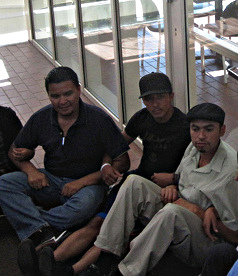Did you know that Truthout is a nonprofit and independently funded by readers like you? If you value what we do, please support our work with a donation.

Tucson, Ariz. – A controversial Arizona law targeting ethnic studies in public schools will take effect come midnight.
Like the state’s tough immigration law – which a federal judge put mostly on hold last summer – the new measure that Gov. Jan Brewer signed in May has sparked protests and legal action, as well as concerns about the future of education.
The law bans classes that promote the overthrow of the United States government and resentment toward a race or class of people. Also outlawed are courses designed primarily for students of a particular ethnic group and those that advocate ethnic solidarity rather than treat students as individuals.
In Arizona, critics claim that the law – along with the partially suspended immigration law – threatens to make the state a “new South” of discrimination against minorities. Meanwhile, educators in states such as California worry that the law could become a model for other states to follow.
For his part, Tom Horne, the force behind the Arizona law, says ethnic studies serve to divide rather than unite. “Fundamentally, I think it’s wrong to divide students by race,” says Mr. Horne, the outgoing Arizona schools superintendent, who was elected state attorney general in November.
The program teaches “one-sided propaganda” and is inconsistent with American values, he adds
Horne helped draft the law in response to complaints about a program that teaches Mexican-American history and culture in the Tucson Unified School District, the city’s largest with more than 50,000 students. He plans to announce Monday the district is in violation of the law. It will be his last day in that office.
District Defends Program
Opponents of the law say Horne’s actions are politically motivated, and they point out he has never attended a class to learn first-hand about a program that is offered to all students, not just those of Mexican heritage.
“The state has no business telling the local school board what to teach,” says Roberto Rodriguez, a professor at the University of Arizona and member of the district’s Mexican-American studies advisory board. “The state superintendent is overreaching – meddling, literally.”
Mexican-American studies has evolved over several years and has had “some pretty significant achievement results,” says John Pedicone, the district’s newly-hired superintendent. “It’s done some very important things, we believe, for an underserved population. The students that go through the program seem to do very well.”
Mr. Pedicone says district data shows that about 70 to 75 percent of the students that go through the program go on to college, compared with 20 to 25 percent of a similar demographic group.
Despite the risk of losing state funds, the district plans to keep its program. Officials believe it is in compliance with the law. “The law was created listing the things that a course of studies cannot do, and the district’s position all along has been that this course of studies does not do that,” says Pedicone.
Once Horne declares the district is breaking the new law, school officials have 60 days to present evidence of compliance at a hearing, Pedicone says. The ultimate decision rests with Horne’s successor, John Huppenthal, a Republican senator from the Phoenix area who also has been critical of ethnic studies both at the Tucson district and at the University of Arizona.
Impact Beyond Arizona
The impact of the law is worrisome to educators and students around the state. Teacher representatives at the University of Arizona recently formally stated their opposition to a law they say sends the wrong message to Arizona students.
Concerns over the law also reach beyond the state. In early December, teachers and students attended a discussion and presentation about the Arizona ethnic studies law on the University of California, Los Angeles campus.
“They thought it could have implications in California,” says Shaena Engle, a spokeswoman with UCLA’s Graduate School of Education and Information Studies.
Professor Rodriguez says it’s not the first time such programs have been singled out, but now “it’s being acted upon.” He views the state’s ethnic studies and immigration laws as attacks on all Hispanics and as reasons why some people might refer to Arizona as “the new south.”
Media that fights fascism
Truthout is funded almost entirely by readers — that’s why we can speak truth to power and cut against the mainstream narrative. But independent journalists at Truthout face mounting political repression under Trump.
We rely on your support to survive McCarthyist censorship. Please make a tax-deductible one-time or monthly donation.